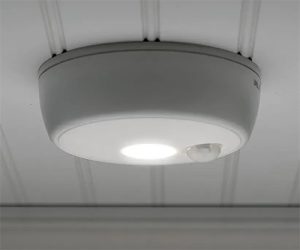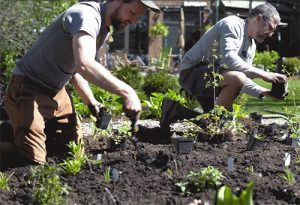Entrepreneur Spotlight: David Levine, My Home Park

David Levine is hooked on entrepreneurship. Now on his third venture, Levine credits his enterprising spirit to his father, who owned and operated a drug store in New England. Along with being innovative, Levine says his dad was “un-hirable.”
“He couldn’t work for anybody—it was just his personality,” Levine explains.
Indeed, there’s a certain type of person that is well-suited for entrepreneurship. More than anything else, Levine believes, there needs to be a fundamental fear of failure.
“The burning desire not to fail is far more important than the burning desire to succeed,” he says. “You have to say to yourself, ‘I’m going to make this work no matter what.’”
His first attempt at business ownership came after the internet startup he was working for went bust in 2000. After getting introduced to local product developers, Levine decided to take a page out of his father’s book and start a business making power tools.
The merchandise was well received. His line of power tools was carried in big box stores like Target, TruValue and Walgreens. But after five years and an underlying problem with the business model, Levine realized it was time to move on.
“The lesson to me was, who you choose as your customer is important,” Levine says, citing his strategy to enter mass retail first. “It really defines who you become. I learned that it needs to be a mutually beneficial relationship.”
“The burning desire not to fail is far more important than the burning desire to succeed. You have to say to yourself, ‘I’m going to make this work no matter what.’”
For his second entrepreneurial venture, Levine took a different approach, carefully considering his customer base and founding Wireless Environment, a tech company that made the Mr. Beams line of easy-to-install home lighting. Levine’s products featured a number of innovations and technology that allowed customization, motion activation, automation and more.

Initially approaching catalogs and niche e-commerce markets, Levine worked to create customer loyalty within their target audience, allowing Wireless Environment to establish itself as a significant brand, increase market share and scale operations.
The company was acquired by Ring in 2017 and then Amazon in 2018, and Levine credits his success to good decision-making and sound support from investing partners including JumpStart Ventures. He says that JumpStart’s advisors and mentors helped him understand how to have “a bigger idea.”
“At the time, we functioned as a lighting company; a consumer product company,” he explains. “JumpStart helped us position ourselves as a technology company.”
As his three-year commitment with Amazon started to wind down, Levine felt the familiar founder’s itch; except this time, he wanted to do something that would benefit society.
“I had some ideas for new products and then it just hit me one day,” Levine says. “What good is it making another product when there are so many other challenges in the world that need to be solved.”
Levine had a habit of observing the bees when he was in his garden at home. He appreciated their pleasant buzzing about and dutiful pollinating. Perhaps he could make a product that could help this backyard bug—something like a better bee house.
Keen on helping the bees, Levine set out to learn more and was introduced to Wyatt Shell, a scientist and scholar specializing in wild bee ecology and behavior. Shell assured Levine that bees didn’t need a better house. They already have the perfect house: their natural habitat, native plants. But what they desperately need is more native plants.
As pollinators, bees are essential to our ecosystems, not to mention global food production. But over the last century, their populations have plummeted due to habitat destruction brought on by industrialized agriculture, pesticides and climate change.
Shell told Levine that he wished there could be a way to give people an incentive to plant native plants. The comment struck a chord with Levine—that was a pain point that needed to be solved. With his entrepreneurial gears set in motion, Levine proposed that they join forces now a bee biologist and tech entrepreneur are empowering people to restore pollinator habitats.
“I had some ideas for new products and then it just hit me one day. What good is it making another product when there are so many other challenges in the world that need to be solved.”
My Home Park, co-founded by Shell and Levine, is a digital platform that creates curated gardens delivered right to their customers’ doorstep, taking the guesswork, effort and frustration out of landscaping with native plants. For people who want to do something beneficial for the environment, My Home Park offers the most bang for your buck. In just 100 square feet, native plants feed up to 2,000 pollinators per day, conserve 2,300 gallons of water per year and provide 16x greater soil stabilization.

Users can browse by color preferences, sun exposure, soil composition or ecological benefits and choose from predesigned garden layouts that are easy-to-install thanks to the planting map. It enables residents to make their homes into habitats, supporting pollinators, preserving biodiversity, improving soil regeneration and helping with stormwater retention. Currently, My Home Park offers their plant mixes to seven states in and around the Great Lakes with plans to expand into New England and the Mid-Atlantic by the end of the year.
Levine remains engaged with JumpStart to this day, keeping up with his advisor and making use of the entrepreneurial resource connections.
“I’ve learned a lot—I learned when it was time to get a CFO. I learned when it was time to get a professional board,” Levine says. “JumpStart is really great at helping entrepreneurs understand the stages of growth and the things you can do to improve your success rate.”